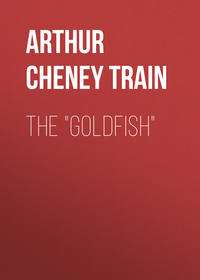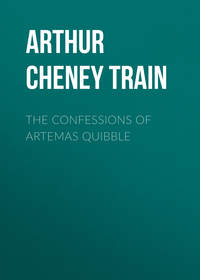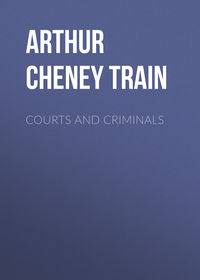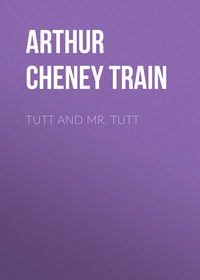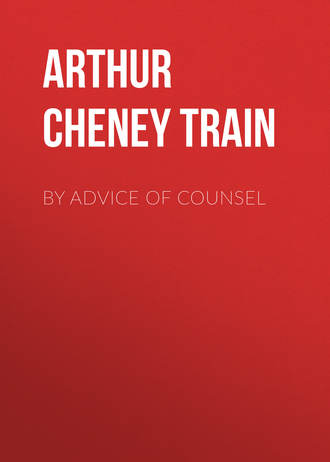 полная версия
полная версияBy Advice of Counsel
"When did you last see him?"
"Yesterday afternoon."
The judge unfolded the papers and appeared to be reading them for the first time. He wasn't such a bad old actor himself, for he had already learned from Mr. Tutt that Hogan had not been near Tony for three weeks.
"Um—um! Did you represent the defendant in the police court?"
"Yes, Your Honor."
"Why did you waive examination?"
Hogan suddenly felt a lump swelling in his pharynx. What in hell was it all about?
"I—er—there was no use in fighting the case there. I hoped the grand jury would throw it out," he stammered.
"Did anybody ask you to waive examination?"
The swelling in Hogan's fat neck grew larger. Suppose McGurk or Delany were trying to put something over on him!
"No! Certainly not!" he replied unconvincingly. He didn't want to make the wrong answer if he could help it.
"You have an—associate, have you not? A Mr. Simpkins?"
"Yes, Your Honor." Hogan was pale now and little beads were gathering over his eyebrows.
"Where is he?"
"Downstairs in the magistrate's court."
"Officer," ordered the judge, "send for Mr. Simpkins. We will suspend until he can get here."
Then His Honor occupied himself with some papers, leaving Hogan standing alone at the bar trying to work out what it all meant. He began to wish he had never touched the damn case. Everybody in the courtroom seemed to be looking at him and whispering. He was most uncomfortable. Suppose that crooked cop had welshed on him! At the same instant in the back of the room a similar thought flashed through the mind of Delany. Suppose Hogan should welsh on him! Coincidentally both scoundrels turned sick at heart. Then came to each the simultaneous realization that neither could gain anything by giving the other away, and that the only thing possible for either was to stand pat. No, they must hang together or assuredly hang separately. Then the door opened and a tall officer entered, followed by a very nervous Mr. Joey Simpkins.
"Come up here!" directed the judge. "You are Mr. Hogan's assistant, are you not?"
"Yes, sir!" quavered the anxious Simpkins.
"How much money have you taken from Mrs. Mathusek?"
"Four hundred and thirty-five dollars."
"For what?" sharply.
"For protecting her son."
"Where? How?"
"Why—from his arrest to the present time—and for his defense here in General Sessions."
"Have either you or Mr. Hogan done anything as yet—except to waive examination in the police court?"
Mr. Simpkins turned hastily to Mr. Hogan, who realized that things were going badly.
"Your Honor," he interposed thickly, "this money was an agreed fee for my services as counsel. This examination seems to me somewhat uncalled for and unfair."
"Call Tony Mathusek to the bar!" suddenly ordered the judge.
It was a dangerous play, but Hogan decided to bluff it through.
"In view of the fact that I have not received my fee I shall refuse to appear for the defendant!" he announced brazenly.
"Indeed!" retorted the judge with sarcasm. "Then I will assign Mr. Ephraim Tutt to the defense. You two gentlemen will please sit down—but not leave the courtroom. We may need you."
At that moment, just as the defendant was led to the bar, Mr. Tutt emerged from behind the jury box and took his stand at Tony's side. Nothing much to look at before, the boy was less so now, with the prison pallor on his sunken little face. There was something about the thin neck, the half-open mouth and the gaunt, blinking, hollow eyes that suggested those of a helpless fledgling.
"Impanel a jury!" continued the judge, and Mr. Tutt conducted Tony inside the rail and sat down beside him at the table reserved for the defendant.
"It's all right, Tony!" he whispered. "The frame-up isn't on you this time, my lad."
Cowering in the back of the room Delany tried to hide himself among the spectators. Some devilish thing had gone wrong. He hadn't heard all that had passed between the judge and Hogan, but he had caught enough to perceive that the whole case had gone blooey.
Judge Watkins was wise! He was going after Hogan just as old Tutt would go after him, Delany. There was a singing in his head and the blood smarted in his eyes. He'd better beat it! Half bent over he started sneaking for the door.
"Who is that man trying to go out?" shouted the judge in terrifying tones that shook Delany to the ankles. Hastily he tried to sit down.
"Bring that man to the bar!"
Half blind with fear Delany attempted to make a show of bravado and swagger to the rail.
"What is your name?"
"Delany. Officer attached to the Second Precinct."
"What were you leaving the room for?"
Delany could not answer. His wits were befogged, his throat numb. He simply stared vacuously at Judge Watkins, his lips vibrating with fear.
"Sit down. No; take the stand!" cried Judge Watkins. "I'll try this case myself."
As if his foot were already attached to a ball and chain Delany dragged himself up—up—hundreds of feet up, it seemed—to the witness chair. As if from a mountain side he saw dim forms moving into the jury box, heard the judge and Mr. Tutt exchanging meaningless remarks. The faces before him grinned and gibbered at him like a horde of monkeys. They had got him at last—all for a few pieces of rotten beef! That lean, hungry wolfhound would tear his tongue out by the roots if he even opened his mouth; claw wide open his vitals. And old Tutt was fixing him with the eye of a basilisk and slowly turning him to stone. Somebody sure had welshed! He had once been in a side show at Coney Island where the room simulated the motion of an ocean steamer. The courtroom began to do the same—slanting this way and that and spinning obliquely round and round. Through the swirl of its gyrations he could see old Tutt's vulture eyes, growing bigger, fiercer, more sinister every instant. It was all up with him! It was an execution, and the crowd down below were thirsting for his blood, waiting to tear him to bits!
"You saw this boy throw a brick through Mr. Froelich's window, didn't you?" coaxed Judge Watkins insinuatingly. Delany sensed that the old white fox was trying to trick him—get him for perjury. No! He wouldn't perjure himself again! No! But what could he do? His head swung stupidly, swaying like a dazed bull's. The sweat poured from every pore in his vast bulk. A hoarse noise—like a death rattle—came from his throat. The room dissolved in waves of white and black. Then in a vertigo he toppled forward and pitched headlong to the floor.
Deacon Terry, star reporter for the Tribune, who happened to be there, told his city editor at noon that he had never passed such a pleasant morning. What he saw and heard really constituted, he alleged, a great big full front-page story "in a box"—though it got only four sticks on the eleventh page—being crowded out by the armistice. Why, he said, it was the damnedest thing ever! There had been no evidence against the defendant at all! And after the cop had collapsed Judge Watkins had refused to dismiss the case and directed Mr. Tutt to go on in his own way.
The proceeding had resolved itself into a criminal trial of Hogan and Simpkins. Tony's good character had been established in three minutes, and then half a dozen reputable witnesses had testified that the brick had been thrown by an entirely different boy. Finally, Sussman and his assistant both swore positively that Delany had been in the back of the tobacco shop with his back to the door, holding them up for cigars, when the crash came.
Terry wanted two columns; he almost cried when they cut his great big full-page story to:
SHYSTERS ACCUSED OF EXTORTION
A dramatic scene was enacted at the conclusion of a minor case in Part I of the General Sessions yesterday, when upon the motion of Ephraim Tutt, of the firm of Tutt & Tutt, Judge Simeon Watkins, sitting as a committing magistrate, held for the action of the grand jury Raphael B. Hogan and Joseph P. Simpkins, his assistant, for the crime of extortion, and directed that their case be referred to the Grievance Committee of the County Lawyers' Association for the necessary action for their disbarment.
Earlier in the trial a police officer named Delany, the supposed chief witness for the prosecution, fainted and fell from the witness chair. Upon his recovery he was then and there committed for perjury, in default of ten thousand dollars bail. It is understood that he has signified his willingness to turn state's evidence, but that his offer has not been accepted. So far as can be ascertained this is the first time either Hogan or Simpkins has been accused of a criminal offense. District Attorney Peckham stated that in addition to separate indictments for extortion and perjury he would ask for another, charging all three defendants with the crime of conspiracy to obstruct the due administration of the law.
At the conclusion of the proceedings Judge Watkins permitted a voluntary collection to be taken up by Mr. Tutt on behalf of the accused among the jury, the court attendants and the spectators, which amounted to eleven hundred and eighty-nine dollars. In this connection the judge expressed the opinion that it was unfortunate that persons falsely accused of crime and unjustly imprisoned should have no financial redress other than by a special act of the legislature. The defendant in the case at bar had been locked up for six weeks. Among the contributions was found a new one-thousand-dollar bill.
"Talk about crime!" quoth the Deacon savagely to Charlie Still, of the Sun. "That feckless fool at the city desk committed assault, mayhem and murder on that story of mine!" Then he added pensively: "If I thought old man Tutt would slip me a thousand to soothe my injured feelings I'd go down and retain his firm myself!"
The Kid and the Camel
Breathes there the man with soul so deadWho never to himself hath said,This is my own, my native land!—LAY OF THE LAST MINSTREL.The shortest street in the world, Edgar Street, connects New York's financial center with the Levant. It is less than fifty feet through this tiny thoroughfare from the back doors of the great Broadway office buildings to Greenwich Street, where the letters on the window signs resemble contorted angleworms and where one is as likely to stumble into a man from Bagdad as from Boston. One can stand in the middle of it and with his westerly ear catch the argot of Gotham and with his easterly all the dialects of Damascus. And if through some unexpected convulsion of Nature 51 Broadway should topple over, Mr. Zimmerman, the stockbroker, whose office is on the sixth story, might easily fall clear of the Greek restaurant in the corner of Greenwich Street, roll twenty-five yards more down Morris Street, and find himself on Washington Street reading a copy of Al-Hoda and making his luncheon off baha gannouge, majaddarah and milookeiah, which, after all, are only eggplant salad, lentils and rice, and the popular favorite known as Egyptian Combination.
To most New Yorkers this is a section of the city totally unknown and unsuspected, yet existing as in a fourth dimension within a stone's throw—and nearer—of our busiest metropolitan artery—and there within one hundred yards of the aforesaid Mr. Zimmerman's office above the electric cars of Broadway, and within earshot of the hoots of many a multimillionaire's motor, on a certain evening something of an Oriental character was doing in the hallway of a house on Washington Street that subsequently played a part in the professional lives of Tutt & Tutt.
Out of the literally Egyptian darkness of the tenement owned by Abadallah Shanin Khaldi issued curious smothered sounds, together with an unmistakable, pungent, circuslike odor.
"Whack!"
There came an indignant grunt, followed by a flabby groan and a straining and squeaking of the jerry-built staircase as Kasheed Hassoun vigorously applied a lath to the horny backsides of Eset el Gazzar.
"Ascend, dog of a dog!" panted Kasheed. "Move thy accursed feet, O wizened hump! Daughter of Satan, give me room! Thou art squeezing out my life! Only go on, child of my heart! It is but a step upward, O Queen of the Nile. Hold the rope tight, Kalil!"
The camel obediently surged forward, breaking off a section of banister. Through the racket from the hallway above faintly came the voice of Kalil Majdalain.
"Her head is free of the ceiling. Quick, Kasheed! Turn her, thou, upon the landing!"
"Whack!" responded the lath in the hand of Kasheed Hassoun.
Step by step the gentle shaggy brute felt her way with feet, knees and nozzle up the narrow staircase. What was this but another of those bizarre experiences which any camel-of-the-world must expect in a land where the water wells squirted through a tube and men rode in chariots driven by fire?
"Whack!"
"Go on, darling of my soul!" whispered Kasheed. "Curses upon thy father and upon the mother that bore thee! Wilt thou not move?"
"Whack!"
"Ouch! She devil! Thou hast trod upon my foot!"
Outside, that the Western world might not suspect what was going on, Shaheen Mahfous and Shanin Saba unloaded with as much noise as possible a dray of paper for Meraat-ul-Gharb, the Daily Mirror. By and by a window on the fourth floor opened and the head of Kalil Majdalain appeared.
"Mahabitcum!" he grinned; which, being interpreted, means "Good fellowship to all!"
Then presently he and Kasheed joined the others upon the sidewalk, and, the rolls of paper having been delivered inside the pressroom, the four Syrians climbed upon the truck and drove to the restaurant of Ghabryel & Assad two blocks farther north, where they had a bit of awamat, coffee and cigarettes, and then played a game of cards, while in the attic of the tenement house Eset el Gazzar munched a mouthful of hay and tapped her interior reservoir for a drink of clear water, as she sighed through her valvelike nostrils and pouted with her cushioned lips, pondering upon the vagaries of quadrupedal existence.
Willie Toothaker, the office boy of Tutt & Tutt, had perfected a catapult along the lines of those used in the Siege of Carthage—form derived from the appendix of Allen and Greenough's Latin Grammar—which boded ill for the truck drivers of lower Gotham.
Since his translation from Pottsville Center, Willie's inventive genius had worked something of a transformation in the Tutt & Tutt offices, for he had devised several labor-saving expedients, such as a complicated series of pulleys for opening windows and automatically closing doors without getting up; which, since they actually worked, Mr. Tutt, being a pragmatist, silently, patiently and good-naturedly endured. To-day both partners were away in court and Willie had the office to himself with the exception of old Scraggs.
"Bet it'll shoot a block!" asserted Willie, replacing his gum, which he had removed temporarily to avert the danger of swallowing it in his excitement. "Caesar used one just like this—only bigger, of course. See that scuttle over on Washington Street? Bet I can hit it!"
"Bet you can't come within two hundred feet of it!" retorted the watery-eyed scrivener. "It's a lot further'n you think."
"'Tain't neither!" declared Willie. "I know how far it is! What can we shoot?"
Scraggs' eye wandered aimlessly round the room.
"Oh, I don't know."
"Got to be something with heft to it," said Willie. "'S got to overcome the resistance of the atmosphere."
"How about that paperweight?"
"'S too heavy."
"Well—"
"I know!" exclaimed William suddenly. "Gimme that little bottle of red ink. 'S just about right. And when it strikes it'll make a mark so's we can tell where we hit—like a regular target."
Scraggs hesitated.
"Ink costs money," he protested.
"But it's just the thing!" insisted Willie. "Besides, you can charge me for it in the cash account. Give it here!"
Conscience being thus satisfied the two eagerly placed the ink bottle in the proper receptacle, which Willie had fashioned out of a stogy box, twisted back the bow and aimed the apparatus at the slanting scuttle, which projected from a sort of penthouse upon the roof of the tenement house across the street.
"Now!" he exclaimed ecstatically. "Stand from under, Scraggs!"
He pressed a lever. There was a whang, a whistle—and the ink bottle hurtled in a beautiful parabola over Greenwich Street.
"Gee! look at her go!" cried Willie in triumph. "Straight's a string."
At exactly that instant—and just as the bottle was about to descend upon the penthouse—the scuttle opened and there was thrust forth a huge yellow face with enormous sooty lips wreathed in an unmistakable smile. On the long undulating neck the head resembled one of the grotesque manikins carried in circus parades. Eset el Gazzar in a search for air had discovered that the attic scuttle was slightly ajar.
"Gosh! A camel!" gasped Willie.
"Lord of love!" ejaculated Scraggs. "It sure is a camel!"
There was a faint crash and a tinkle of glass as the bottle of red ink struck the penthouse roof just over the beast's head and deluged it with its vermilion contents. Eset reared, shook her neck, gave a defiant grunt and swiftly withdrew her head into the attic.
Sophie Hassoun, the wife of Kasheed, seeing the violent change in Eset's complexion, wrung her hands.
"What hast thou done, O daughter of devils? Thou art bleeding! Thou hast cut thyself! Alack, mayhap thou wilt die, and then we shall be ruined! Improvident! Careless one! Cursed be thy folly! Hast thou no regard? And I dare not send for Doctor Koury, the veterinary, for then thy presence would be discovered and the gendarmes would come and take thee away. Would that we had left thee at Coney Island! O, great-granddaughter of Al Adha—sacred camel of the Prophet—why hast thou done this? Why hast thou brought misery upon us? Awar! Awar!"
She cast herself upon the improvised divan in the corner, while Eset, blinking, licked her big yellow hind hump, and tumbled forward upon her knees preparatory to sitting down herself.
"A camel!" repeated Willie, round-eyed. He counted the roofs dividing the penthouse from where Morris Street bisected the block. "Whoop!" he cried and dashed out of the office.
In less than four minutes Patrolman Dennis Patrick Murphy, who was standing on post on Washington Street in front of Nasheen Zereik's Embroidery Bazaar talking to Sardi Babu, saw a red-headed, pug-nosed urchin come flying round the corner.
"One—two—three—four—five. That's the house!" cried Willie Toothaker. "That's it!"
"What yer talkin' 'bout?" drawled Murphy.
"There's a camel in there!" shouted Willie, dancing up and down.
"Camel—yer aunt!" sneered the cop. "They couldn't get no camel in there!"
"There is! I seen it stick its head out of the roof!"
Sardi Babu, the oily-faced little dealer in pillow shams, smiled slyly. He had thick black ringlets, parted exactly down the middle of his scalp, hanging to his shoulders, and a luxuriant black curly beard reaching to his middle; in addition to which he wore a blue blouse and carpet slippers. He was a Maronite from Lebanon, and he and his had a feud with Hassoun, Majdalain, and all others who belonged to the sect headed by the Patriarch of Antioch.
"Belki!" he remarked significantly. "Perhaps his words are true! I have heard it whispered already by Lillie Nadowar, now the wife of Butros the confectioner. Moreover, I myself have seen hay on the stairs."
"Huh?" exclaimed Murphy. "We'll soon find out. Come along you, Babu! Show me where you was seein' the hay."
By this time those who had been lounging upon the adjacent doorstep had come running to see what was the matter, and a crowd had gathered.
"It is false—what he says!" declared Gadas Maloof the shoemaker. "I have sat opposite the house day and night for ten—fifteen years—and no camel has gone in. Camel! How could a camel be got up such narrow stairs?"
"But thou art a friend of Hassoun's!" retorted Fajala Mokarzel the grocer. "And," he added in a lower tone, "of Sophie Tadros, his wife."
There was a subdued snicker from the crowd, and Murphy inferred that they were laughing at him.
"But this man," he shouted wrathfully, pointing at Sardi Babu, "says you all know there's a camel up there. An' this kid's seen it! Come along now, both of you!"
There was an angry murmur from the crowd. Sardi Babu turned white.
"I said nothing!" he declared, trembling. "I made no complaint. The gendarme will corroborate me. What care I where Kasheed Hassoun stables his camel?"
Maloof shouldered his way up to him, and grasping the Maronite by the beard muttered in Arabic: "Thou dog! Go confess thy sins! For by the Holy Cross thou assuredly hast not long to live!"
Murphy seized Babu by the arm.
"Come on!" he ordered threateningly. "Make good now!" And he led him up the steps, the throng pressing close upon his heels.
"What's all this?" inquired Magistrate Burke bewilderedly an hour later as Officer Murphy entered the police court leading a tall Syrian in a heavy overcoat and green Fedora hat, and followed by several hundred black-haired, olive-skinned Levantines. "Don't let all those Dagos in here! Keep 'em out! This ain't a moving-picture palace!"
"Them ain't Dagos, judge," whispered Roony the clerk. "Them's Turks."
"They ain't neither Turks!" contradicted the stenographer, whose grammar was almost sublimated by comparison with Roony's. "They're Armenians—you can tell by their complexions."
"Well, I won't have 'em in here, whatever they are!" announced Burke. "I don't like 'em. What have you got, Murphy?"
"Shoo! Get out of here!" ordered the officer on duty.
The crowd, however, not understanding, only grinned.
"Avanti! Alley! Mouch! Beat it!" continued the officer, waving his arms and hustling those nearest toward the door.
The throng obediently fell back. They were a gentle, simple-minded lot, used in the old country to oppression, blackmail and tyranny, and burning with a religious fervor unknown to the pale heterodoxy of the Occident.
"This here," began Murphy, "is a complaint by Sardi Babu"—he swung the cowering little man with a twist before the bench—"against one Kasheed Hassoun for violating the health ordinances."
"No, no! I do not complain! I am not one who complains. It is nothing whatever to me if Kasheed Hassoun keeps a camel! I care not," cried Babu in Arabic.
"What's he talkin' about?" interrupted Burke. "I don't understand that sort of gibberish."
"He makes the complaint that this here Hassoun"—he indicated the tall man in the overcoat—"is violating Section 1093d of the regulations by keeping a camel in his attic."
"Camel!" ejaculated the magistrate. "In his attic!"
Murphy nodded.
"It's there all right, judge!" he remarked. "I've seen it."
"Is that straight?" demanded His Honor. "How'd he get it up there? I didn't suppose—"
Suddenly Sardi Babu threw himself fawning upon Hassoun.
"Oh, Kasheed Hassoun, I swear to thee that I made no complaint. It is a falsification of the gendarme! And there was a boy—a red and yellow boy—who said he had seen thy camel's head above the roofs! I am thy friend!"
He twisted his writhing snakelike fingers together. Hassoun regarded him coldly.
"Thou knowest the fate of informers and provocateurs—of spies—thou infamous Turk!" he answered through his teeth.
"A Turk! A Turk!" shrieked Sardi Babu frantically, beating the breast of his blue blouse. "Thou callest me a Turk! Me, the godson of Sarkis Babu and of Elias Stephan—whose fathers and grandfathers were Christians when thy family were worshipers of Mohammed. Blasphemy! Me, the godson of a bishop!"
"I also am godson of a bishop!" sneered Kasheed. "A properly anointed bishop! Without Tartar blood."
Sardi Babu grew purple.
"Ptha! I would spit upon the beard of such a bishop!" he shrieked, beside himself.
Hassoun slightly raised his eyebrows.
"Spit, then, infamous one—while thou art able!"
"Here, here!" growled Burke in disgust. "Keep 'em still, can't you? Now, what's all this about a camel?"
"That's the very scuttle, sir," asseverated Scraggs to the firm, as Tutt & Tutt, including Miss Wiggin, gazed down curiously out of their office windows at the penthouse upon the Washington Street roof which had been Willie's target of the day before. "I don't say," he continued by way of explanation, "that the camel stuck his head out because Willie hit the roof with the bottle—it was probably just a circumstance—but it looked that way. 'Bing!' went the ink bottle on the scuttle; and then—pop!—out came the camel like a jack-in-the-box."


